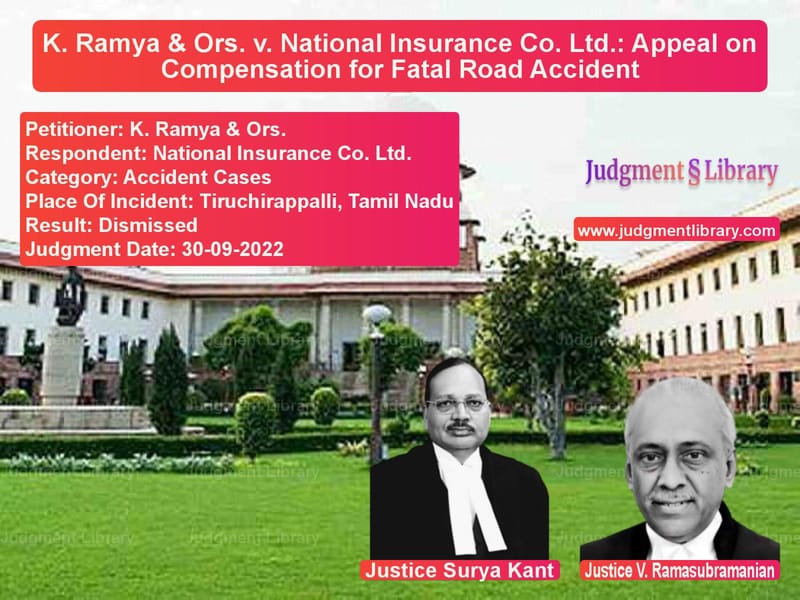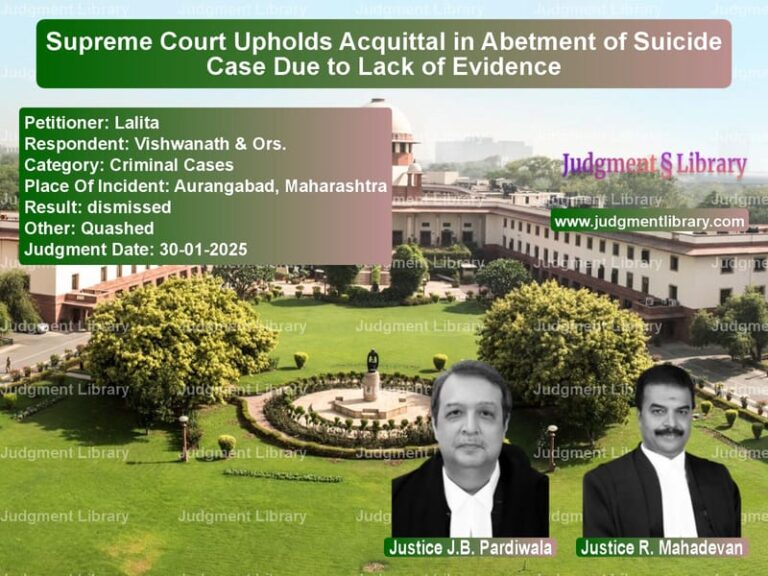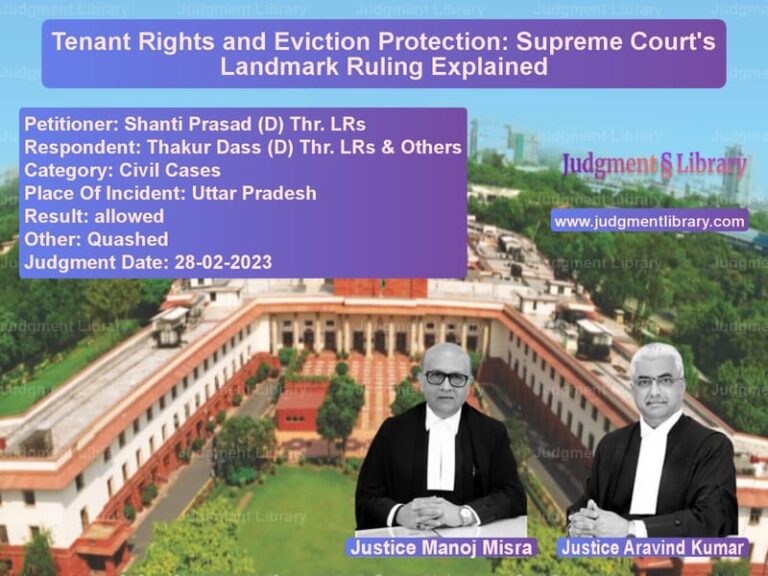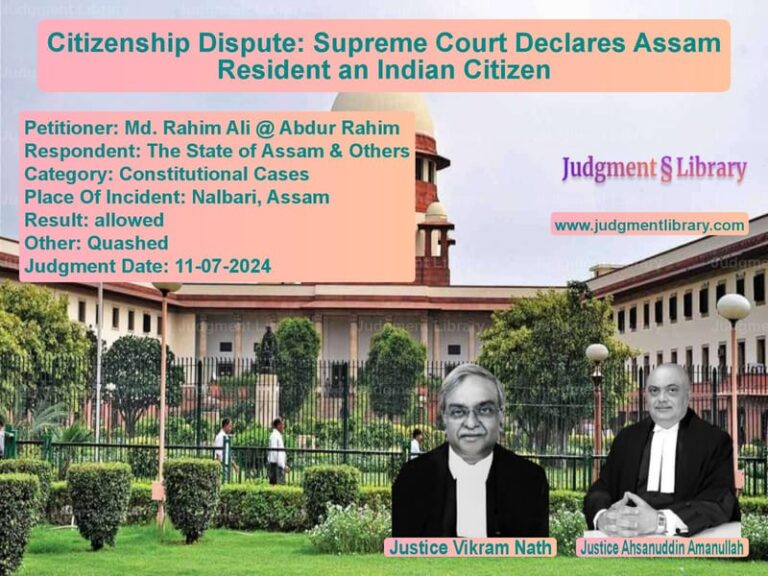K. Ramya & Ors. v. National Insurance Co. Ltd.: Appeal on Compensation for Fatal Road Accident
The case of K. Ramya & Ors. versus National Insurance Co. Ltd. revolves around the determination of compensation following a fatal road accident that resulted in the death of S. Kumareshan. The deceased, a resident of Tiruchirappalli, Tamil Nadu, was involved in a tragic collision on June 10, 2004, with an Ambassador car, which led to his death. The issue at hand is the quantum of compensation to be awarded to the legal heirs of the deceased after the accident, and whether the amount of Rs. 4,29,37,700 awarded by the Motor Vehicle Accident Claims Tribunal (Tribunal) was correct, or whether the High Court’s reduction of the compensation to Rs. 57,90,000 was justified.
The facts of the case present a tragic scenario. The deceased, S. Kumareshan, was a businessman with multiple interests, including jewellery, textiles, exports, and transport, and was also involved in agricultural activities. On the fateful day, he was driving his car, a Lancer bearing Registration No. TN 45 S 9199, when it collided with an Ambassador car bearing Registration No. TN 59 E 9288. Both the drivers of the cars died on the spot, and the only survivors were the passengers in the Ambassador car, who sustained multiple injuries.
Following the accident, the legal heirs of the deceased filed a claim petition in the Tribunal for compensation under the Motor Vehicles Act, 1988. The claim was based on the argument that the accident occurred due to the rash and negligent driving of the driver of the Ambassador car, which was insured by the National Insurance Co. Ltd. The claimants sought a total compensation of Rs. 7,00,00,000 for the loss of their family member, with the primary contention being that the deceased had significant earning capacity, which was now lost due to his untimely demise.
The respondent, National Insurance Co. Ltd., contested the claim, asserting that the deceased was responsible for the accident. The insurance company argued that the deceased was at fault, and that the compensation sought by the claimants was exorbitant. Despite the insurance company’s objections, the Tribunal held that the driver of the Ambassador car was solely responsible for the crash and thus, liable for the accident. The Tribunal awarded a compensation of Rs. 4,29,37,700 along with interest at the rate of 7.5% per annum. The Tribunal based its decision on the evidence provided by the legal heirs, including the income tax returns and other financial documents of the deceased.
However, the National Insurance Co. Ltd. appealed to the High Court, arguing that the compensation was excessive and that the Tribunal had made errors in calculating the loss of income. The High Court, while agreeing with the Tribunal’s conclusion that the driver of the Ambassador car was at fault, reduced the compensation awarded to Rs. 57,90,000. The High Court noted that the deceased’s income primarily came from capital assets, and that income generated from capital should not be considered as earned income. Consequently, the High Court reduced the compensation on the basis that there was no real contribution from the deceased’s skills or professional capacity in generating income from his capital assets.
The legal heirs of the deceased, dissatisfied with the High Court’s reduction in compensation, approached the Supreme Court. The main issue before the Supreme Court was whether the High Court had correctly computed the compensation and whether the Tribunal’s initial award was justified. The appellants argued that the deceased had substantial earnings derived from his active involvement in various businesses, and that the compensation should have reflected the true extent of his income and the loss suffered by his family.
The appellant’s counsel, Mr. K. Radhakrishnan, senior counsel, contended that the High Court had erred in determining the compensation on a notional basis and in dismissing the income derived from the deceased’s business ventures. He argued that the income tax returns and audit reports submitted by the claimants clearly reflected the actual income of the deceased, which was based on his active participation in the business. He further stated that the compensation should include the full amount based on the real income of the deceased and should not be reduced on the grounds that the income was from capital assets.
Read also: https://judgmentlibrary.com/enhancement-of-compensation-in-fatal-road-accident-case/
On the other hand, the respondent’s counsel, representing the National Insurance Co. Ltd., argued that the income derived from capital assets should not be included in the compensation calculation. The insurance company’s counsel emphasized that the compensation should be based only on the income generated through the deceased’s personal skills and professional activities, not from passive income derived from his capital investments. The insurance company’s counsel further pointed to the fact that the deceased’s business ventures were not actively managed by him in the years leading to his death, as evidenced by the transfer of his business interests to his children.
The Supreme Court, after hearing both parties, ruled in favour of the appellants, asserting that the High Court’s reduction in compensation was unjustified. The Court noted that the deceased had been actively involved in running multiple business ventures, and that the income from these businesses could not be dismissed as passive income from capital assets. The Court emphasized the importance of considering the actual earning capacity of the deceased and the financial contributions he made to his family. The Court also noted that the Tribunal had correctly relied on the income tax returns and audit reports to compute the income of the deceased and that these documents provided credible evidence of the deceased’s actual income.
The Supreme Court’s judgment reinforced the principle that the calculation of compensation in cases involving fatal accidents should consider the actual earning capacity of the deceased, including income from both personal skills and business ventures. The Court also reiterated the need for fairness and reasonableness in determining compensation, ensuring that the dependents of the deceased receive an amount that adequately compensates them for their loss. In light of this, the Court restored the Tribunal’s original compensation amount of Rs. 4,29,37,700, along with the prescribed interest, and directed the insurance company to pay the enhanced compensation to the legal heirs of the deceased.
Petitioner Name: K. Ramya & Ors..Respondent Name: National Insurance Co. Ltd..Judgment By: Justice Surya Kant, Justice V. Ramasubramanian.Place Of Incident: Tiruchirappalli, Tamil Nadu.Judgment Date: 30-09-2022.
Don’t miss out on the full details! Download the complete judgment in PDF format below and gain valuable insights instantly!
Download Judgment: k.-ramya-&-ors.-vs-national-insurance-c-supreme-court-of-india-judgment-dated-30-09-2022.pdf
Directly Download Judgment: Directly download this Judgment
See all petitions in Road Accident Cases
See all petitions in Compensation Disputes
See all petitions in Motor Vehicle Act
See all petitions in Negligence Claims
See all petitions in Damages and Compensation
See all petitions in Judgment by Surya Kant
See all petitions in Judgment by V. Ramasubramanian
See all petitions in dismissed
See all petitions in supreme court of India judgments September 2022
See all petitions in 2022 judgments
See all posts in Accident Cases Category
See all allowed petitions in Accident Cases Category
See all Dismissed petitions in Accident Cases Category
See all partially allowed petitions in Accident Cases Category







